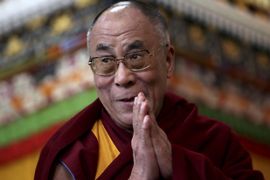South Africa bans Dalai Lama visit
Authorities deny the Tibetan spiritual leader permission to enter the country.

‘Chinese pressure’
A spokesperson for the Dalai Lama told AFP news agency he was “very disappointed” and accused South Africa of succumbing to “intense pressure” from China.
|
“We are shamelessly succumbing to Chinese pressure” Archbishop Tutu |
Archbishop Tutu was quoted as telling the Sunday Independent: “We are shamelessly succumbing to Chinese pressure … I feel deeply distressed and ashamed.”
Thabo Masebe, spokesman for president Kgalema Motlanthe, denied suggestions that the ban was a result of pressure from China.
Masebe said the conference organisers had not consulted them before inviting the Dalai Lama and that a high-profile visit by the Tibetan spiritual leader would have distracted from the conference’s main focus.
“The presence of the Dalai Lama would only serve to divert attention from the important work we are doing with the preparation for the World Cup,” he said.
“The South African government does not have a problem with the Dalai Lama.”
Criticism
Jane Duncan, executive director for the Freedom of Expression Institute of South Africa, said the move violated freedom of expression because “the South African public is deprived of the opportunity of actually interacting with Dalai Lama in the conference”.
|
“It is disappointing that South Africa, which has received so much solidarity from the world, doesn’t want to give solidarity to others” Geir Lundestad, |
The Johannesburg conference is intended to discuss South Africa’s hosting of the World Cup in 2010 and football’s role in fighting racism and xenophobia.
The Tibetan spiritual leader was due to attend the meeting, along with fellow Nobel laureates, Nelson Mandela, Archbishop Tutu and FW de Klerk later this week.
“It is disappointing that South Africa, which has received so much solidarity from the world, doesn’t want to give that solidarity to others,” Geir Lundestad, the Nobel Institute director, told the Associated Press news agency.
The Norwegian government said it “regrets” the South African decision,
and was considering whether to withdraw.
South Africa is China’s largest trading partner in Africa, with 2008 trade standing at $10bn.
Tibetan autonomy
The Dalai Lama has visited the country on two previous occasions, in 1999 and 2004.
| In depth |

|
Masebe said the spiritual leader had been welcomed twice previously in South Africa and would be welcome again in the future but “not now, when the whole world is looking at South Africa”.
The 74-year-old leader of the Tibetan government-in-exile recently repeated a demand for “legitimate and meaningful autonomy” for Tibet, not independence from China.
Beijing brands the Dalai Lama a “splittist” bent on separating Tibet from China, but he said that Tibetans were seeking “an arrangement that would enable Tibetans to live within the framework of the People’s Republic of China”.
The Dalai Lama fled from Lhasa on March 10, 1959, after Chinese forces crushed an uprising against its rule in the Himalayan region.
Since then, he has been living in Dharamsala, in northern India, where he set up the seat of the Tibetan political government in exile.
The Dalai Lama has received many honorary doctorates and awards, including the Nobel Peace Prize in 1989 for opposing violence in his quest for Tibetan autonomy.
 Pictures: 50 years of exile
Pictures: 50 years of exile